When do Puppies Stop Teething?
04.04.2021.
Getting a puppy is a period of joy and excitement. Puppies fill our homes with happiness and laughter, but they come with some annoying behavior that can be rather painful. That behavior is mostly aimed at teething. Puppies have 28 needle-sharp baby teeth that can easily pierce your skin. The worst thing about teething is - a teething puppy seems to have a particular taste for your fingers and toes.
This is not unusual behavior. Puppies will have their adult teeth when they are about 6 months old, which is when puppies stop teething. However, until that time comes, you should know how to help yourself. Most of all, you should know how to help your puppy relieve the discomfort of their baby teeth falling out and their adult teeth growing. Here are a few things you should know about “When do puppies stop teething?”
When do puppies lose their baby teeth?
One of the ways puppies explore the world around them is by biting and nipping. Their first teeth start growing soon after they are born - at about 2 weeks. Puppies will have 28 needle-like teeth that will get them through the earliest stages of their lives.
When a puppy gets between 3 and 4 months of age, they will start losing their baby teeth. Puppies baby teeth will start making room for the 42 adult teeth your puppy will use until the end of their days. When the puppy reaches 6 months, all of their baby teeth should have fallen out. If you notice some of them haven’t fallen out, make sure you notify your vet. The remaining teeth might need vet attention, and a vet might have to manually remove them.
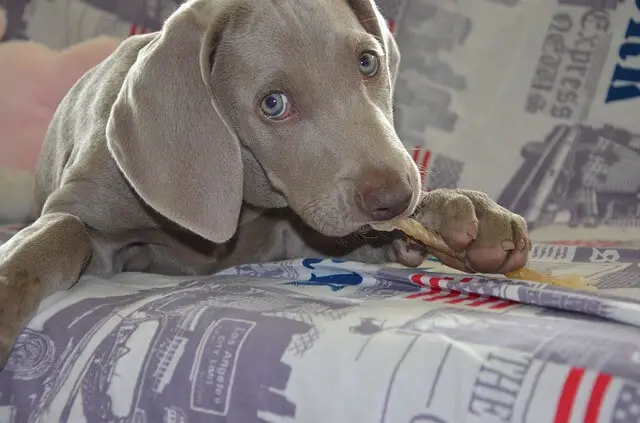
Keeping your hands safe
The teething process can cause different levels of discomfort for puppies. They will want something to chew on, and if you don’t provide them with safe puppy chew toys, they will chew on something they shouldn’t. Puppies might find comfort from their teething pains in your shoes, sofa, clothes, slippers, or your children’s toys. You can’t have that, so make sure you give them a safe chew toy that will help them battle the teething pain.
There are different things you can get your puppy for teething. You can be pretty sure they will love anything you give them, especially if you put the toy in the freezer. The cold toy will soothe their teeth and gums and make some of the pain go away. The best toy for your puppy will depend on the puppy’s bite strength, breed, size, and activity level. Cane Corso or Anatolian Shepherd puppies will have a lot stronger bite than a Havanese puppy.
How to stop your puppy from biting you?
During the teething period, puppies will bite and nip anything they can get their mouths on. Of course, all puppies are individuals, and some might handle this period a lot better than others. However, most of them will experience some level of discomfort, and sooner or later, they will aim at your fingers while you are playing with them.
When puppies are playing with other puppies, they seem very playful and carefree. Still, their playing has specific rules puppies need to obey. They will instinctively bite each other, and they don’t have the best bite control at that age. If one puppy bites another too hard, the bitten puppy will loudly yelp. This is a clear sign to the puppy they are playing too rough. If they do that too many times, their mom will scold them, and other puppies will stop playing with them.
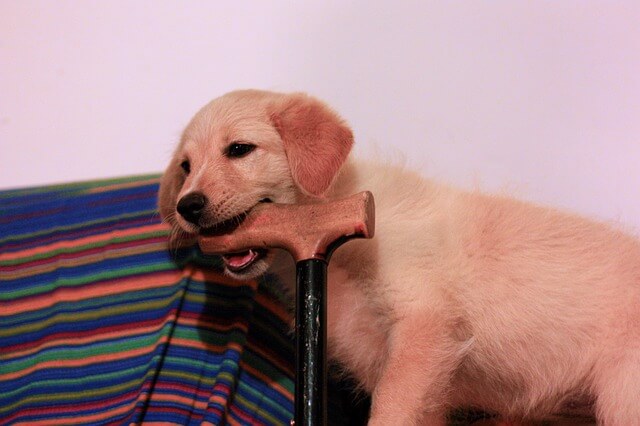
This is important for you to know because you can let your puppy know they are biting you too hard. Make sure you let your puppy know when they bite you a bit too hard that they have crossed the line. You can yell something like, “OW, that hurts!” That is an excellent way of teaching your puppy they need to control their bite while playing with humans. Controlling their bite force is called bite inhibition, and it is a valuable lesson all dogs should learn.
Teaching a puppy what they can bite
You must start teaching your puppy what they can bite and what is off-limits. After the puppy bites you and you yell out, look at their response. If the puppy backed up and stopped biting, give them a treat and praise. If you notice them starting to nip and bite again, offer them a toy, and if that doesn’t work, take them gently to their crate for a short time-out.
The best way to survive the puppy teething period is by giving the puppy toys instead of your fingers and toes. The puppy will learn you are not joking, and biting you will not be rewarded. If you direct their attention to the toy instead of you, they are likely to focus their biting on the fun, cold toy.
EXPERT ADVICE; One of our professional dog trainers gave helpful advice about puppy teething. He said,
“Carrots are a great tool for puppy teething. They are safe for dogs to eat, and if you give your puppy a frozen carrot, they will be occupied with it for quite some time. And the best part is - the puppy will get some extra vitamins!”
You can read more about this advice here - Can dogs eat carrots?
Caring for dog teeth
Cleaning the dog’s teeth is often overlooked. Dogs that are not used to getting their mouth or teeth touched and handled will have a difficult time cleaning their teeth when they are older. Make sure you start getting your puppy used to it when they are still young.
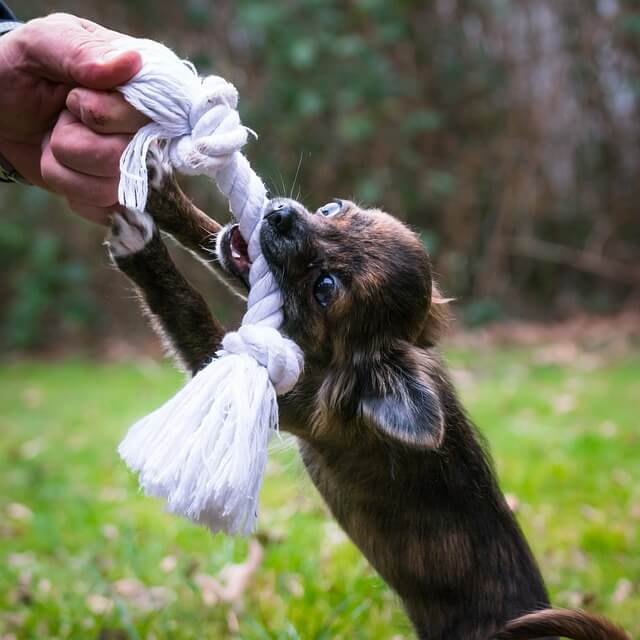
There are dog toothbrushes and toothpaste that will help you with this process. Make sure your dog is used to teeth brushing because it is vital for the health of their teeth and gums. Never use human toothpaste for brushing your dog’s teeth. Human toothpaste can contain xylitol, which is very toxic to dogs.
When your puppy stops teething, at about 6 months, they will have their 42 adult teeth, but they might still be interested in chewing. Make sure you give your adult dog toys they can chew on so they don’t focus on destroying your interior. Check out this article for some suggestions - Best dog toys.
World Dog Finder team

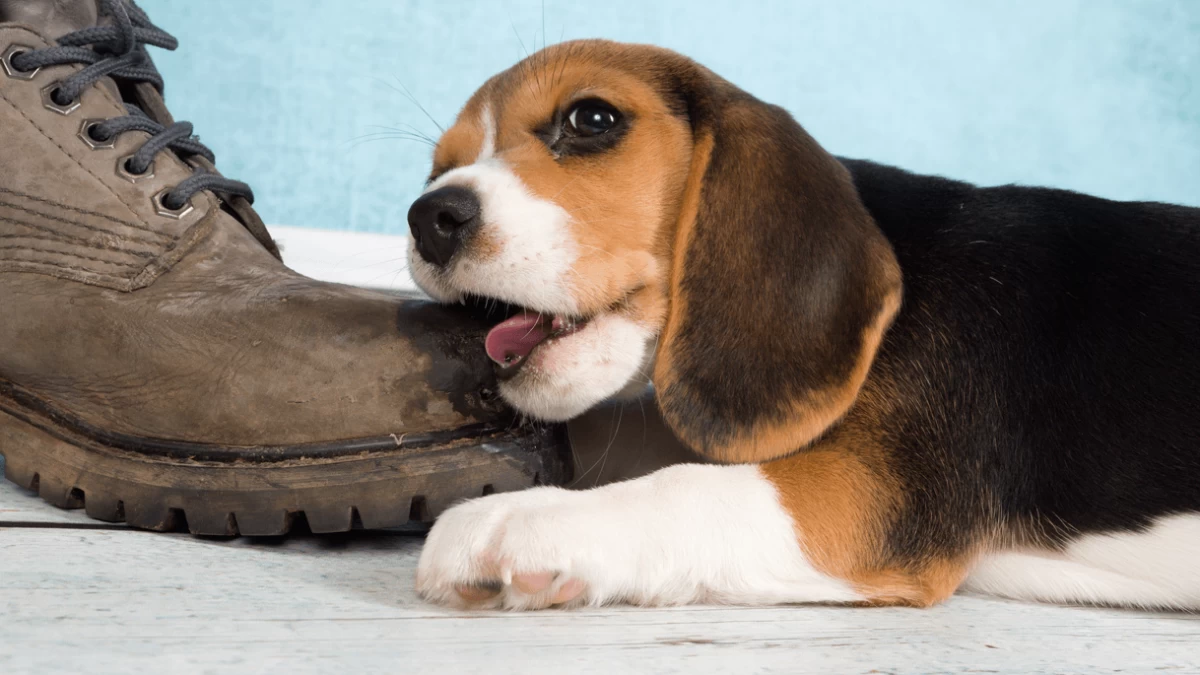
![Best Puppy Treats [2023 review]](https://worlddogfinder.com/imager/334x225/upload/articles/puppy_laying_on_treats.png)
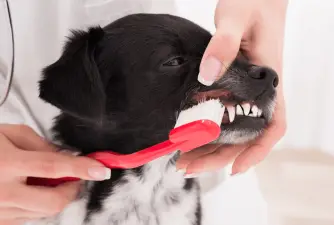
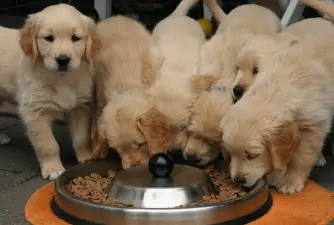
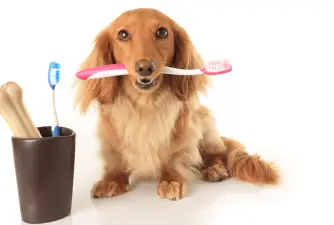

Share